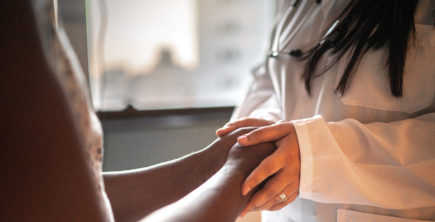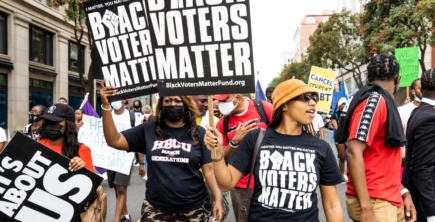
Our Community
“This is a defining moment in our country.”
Rev. Al Sharpton, at a rally in Ferguson, Missouri
August 17, 2014
Three police killings of unarmed black men have dominated national headlines in just two months. Eric Garner, 43, was killed by an NYPD officer who placed him in an illegal chokehold while questioning him for allegedly selling untaxed cigarettes. In Ohio, an open carry state, John Crawford, 22, was shot and killed by police in Wal-Mart after fellow shoppers spotted him holding a toy rifle. And 18-year-old Michael Brown was gunned down by Ferguson police while walking with a friend in the middle of the street. He was shot a total of six times—twice in the head and four times in the arms. Those are just the incidents publicized by the media.
The response by the police departments of Ferguson and St. Louis to Mike Brown’s killing only compounded the problem. The suppression of local and national media; utilization of heavy weaponry and militarized police tactics; the city’s character assassination of Michael Brown; and a complete disrespect for rights afforded to peaceful protesters under the law—all of these things added fuel to the fire.
In a recent segment on Al Jazeera America’s series Fault Lines, one Ferguson resident declared, “We are supposed to be innocent until proven guilty, but we are guilty until proven innocent. When you feel like a target, how the [expletive] are you going to react?”
Attorney General Eric Holder weighed in, saying, “I understand that mistrust. I am the attorney general of the United States. But I am also a black man.” Holder added, “We are starting here a good dialogue. But the reality is the dialogue is not enough. We need concrete action to change things in this country.”
I Am (Michael) Brown
As a biracial woman of color, I recently discovered I wasn’t immune to such treatment by police. On a recent trip to New York City, I was detained by the NYPD for taking a late night stroll with a friend through a “closed” park. Rather than informing us the park was closed and allowing us to go on our way, the officer asked for our IDs. When we informed him we did not have our IDs, he asked for our names and addresses. When I asked Officer Guardado why he was detaining us he replied, “Because I can.” Neither safety concerns nor police protocol resulted in our detention, but his own whim. Because he can.
After having us stand outside for 20 minutes, Officer Guardado and his female partner exited the car and I immediately thought we were going to be arrested. My heartbeat quickened, my hands began to sweat, and my thoughts raced. I haven’t done anything wrong! Why am I so scared? It was 2 am. We were in a dimly lit park with no witnesses. My friend started videotaping.
Officer Guardado handed me a pink notice to appear back in New York in October. “I should arrest you for not having an ID,” he said.
This officer seemed to take pleasure in the power imbalance that existed between us. I am a lawyer and I know my rights. But in that moment, I was too frightened to exercise my First Amendment right and question him. I saw what happened to Eric Garner, who tried to stand up for himself.
How many other stories are there like mine? How close was I to triggering inexplicable police brutality?
From Moment to Movement
Today, many are asking: is this a moment or a movement? Will this be like the 1991 beating of Rodney King by Los Angeles police officers, a moment that failed to achieve significant, lasting reform of policing practices? Or is the response to Ferguson evidence of a new generation of black activism, one that is borrowing and building on the older reform tactics of established civil rights leaders and organizations?
Young activists of color are continuing the work toward justice. And they will soon become the new majority. In the United States, people of color will comprise more than half (53%) of the population by 2042, a trend already established in Hawaii, California, New Mexico and Texas.
Toby Thompkins, Tides’ Vice President of Community Initiatives and Global Partnerships, first introduced the concept of the New Majority Opportunity in 2013, writing that young people of color, as the emerging majority, have the opportunity to create a preferred future for current and coming generations with a lens that includes race, gender, nationality, sexual orientation, religion, physical ability and class. Through this framework and agenda, we define our future together.
Michelle Alexander, author of The New Jim Crow, recently called for a more radical approach:
“I have been wondering what to say in the wake of Michael Brown’s murder and the community uprising that I haven’t already said or that others haven’t already said or cried or yelled. The one thing that I will say that I have not said before (or said clearly enough) is this: We, in the civil rights community, need to recognize this as a wakeup call. WHAT WE HAVE BEEN DOING IS NOT WORKING. And so I wonder how many more times we are going to do this dance of sporadic protests, press conferences, lawsuits, and demands for reform and then … repeat. I will not pretend to have the answers, but I think we ought to ask some different questions, including: If the reform dance fails again and again, isn’t it time we consider a more radical approach?”
Have we reached a substantive scarcity of solutions? What does a more radical approach look like? We all agree it’s time to organize—economically, politically and socially, turning our justified rage into constructive action against identified injustice. Ferguson has brought to the forefront many larger issues in our society, including the militarization of police and police violence; mass incarceration that disproportionately affects black and brown people; the lack of diversity in politics, corporate leadership and law enforcement; and the broader state of race relations in America.
Radical Collaboration
There are organizations all across the country seeking to take a stand, and at Tides we believe radical action requires radical collaboration. We are working closely with the following projects to turn this moment into a movement.
Tides project, Dream Defenders, has quickly become a leading voice in the social justice movement. Started in the wake of the Trayvon Martin murder in February of 2012, Dream Defenders is developing the next generation of Floridian revolutionaries to realize and exercise their power to positively disrupt the systems that oppress our communities, such as the school-to-prison pipeline, stand your ground laws, racial profiling and voter suppression.
The Dream Defenders’ Hands Up, Don’t Shoot Campaign demands immediate justice in Ferguson, including an expanded DOJ investigation into patterns of civil rights violations by police across North St. Louis County; and accountability for police practices and policies, including effective civilian review of shootings and allegations of misconduct. The Department of Justice has already responded, launching a full-scale civil rights investigation into the Ferguson Police Department.
Dream Defenders also makes national, long-term demands, calling on Eric Holder to use the full resources and power of the DOJ to implement a nationwide investigation of systematic police brutality and harassment in communities of color; and the immediate suspension without pay of law enforcement officers that have used excessive force.
Californians for Safety and Justice, another Tides project, works to replace prison and justice system waste with common sense solutions that increase safety and reduce costs. Their 501(c)(4), Vote Safe (housed at The Advocacy Fund), started a ballot measure committee and will have Proposition 47 on the ballot in California this November, allowing voters the chance to reduce seven low-level, nonviolent drug and theft offenses from felonies to misdemeanors. The millions of dollars saved will go towards K-12 education and mental health treatment for prisoners. This groundbreaking law would be the first of its kind in the country.
In collaboration with The Advocacy Fund (TAF), Tides houses the Fund for Fair and Just Policing in New York City (FFJP), a grant making fund that’s been in existence since 2010. Seeking to address the abusive policing practices of the New York Police Department, this fund has granted over $5M to organizations on the ground in New York, including Communities United for Police Reform, Make the Road New York, DRUM and Desis Rising.
The Fund for Fair and Just Policing supports projects that substantially decrease bias-based encounters with the police; increase the ability of the most affected communities to prevent abusive policing and hold the police accountable; and build the political will to advance a more just and humane policing paradigm in New York City.
The work of these organizations has propelled recent changes in NYC’s political environment, including a new mayor and NYPD Commissioner, and the latest outcomes of major court cases (e.g. Floyd, Ligon, Davis) challenging discriminatory policing in NYC. As an Advisor at Tides and The Advocacy Fund, I have worked with these projects for close to three years. I respect the work of these organizations and admire their progress. I am also cognizant of the work they still seek to do.
Here at Tides and TAF, we are asking ourselves, how can we build on our previous work and support this emerging movement to go further?
For over 36 years, Tides has adapted to the needs of the sector and responded with concrete action. We support organizations and programs that are central to our country’s nonprofit and social service sector by providing fiscal sponsorship to over 140 social impact projects and granting millions each year domestically and globally. The Advocacy Fund supports projects in their work to advance the progressive agenda through changes in legislation.
We cannot afford to let this moment pass us by. Many voices are coming together to say: Enough is enough, we need a new approach. And we at Tides recognize that we have a role to play. We take seriously our role as a nexus between activists and funders, the privileged and underprivileged, the enfranchised and disenfranchised. And we hope these collaborations can be amplified, replicated and coordinated to ensure we transform this moment into a meaningful and lasting movement.

Our Community

Healthy Individuals & Communities

Racial Equity

Read the stories and hear the voices of social change leaders fighting for justice.